Permission Letter To Conduct Research
[Your Name]
[Your Address]
[City, State, Zip Code]
[Email Address]
[Phone Number]
[Date]
[Recipient's Name]
[Title/Position]
[Institution/Organization]
[Address]
[City, State, Zip Code]
Subject: Request for Permission to Conduct Research
Dear [Recipient's Name],
I hope this letter finds you in good health and high spirits. My name is [Your Name], and I am a [your academic/professional background or affiliation] with a keen interest in [briefly describe your area of interest or expertise]. I am writing to request your kind permission to conduct research at [Institution/Organization name] as a part of my [mention degree program, if applicable] research project.
The purpose of my research is to [briefly explain the main objectives of your research and its potential benefits or contributions to the field]. The study will involve [describe the research methodology, such as surveys, interviews, observations, experiments, etc.] and is expected to be conducted from [start date] to [end date], though the duration may vary depending on the scope of the research.
I have chosen [Institution/Organization name] as the ideal setting for my research due to [explain why the chosen location is suitable for your research, such as access to resources, expertise, or relevant data]. I assure you that the research will be conducted with the utmost professionalism, adhering to all ethical guidelines and ensuring the privacy and confidentiality of all participants and collected data.
The data collected during the research will be used solely for academic purposes and may be included in my thesis/dissertation or other academic publications. I am committed to sharing the findings with the institution and am open to providing a summary of the results upon completion of the research.
Before proceeding with the research, I kindly request your formal permission to conduct this study at [Institution/Organization name]. Additionally, if there are any specific guidelines, procedures, or forms required by the institution for granting research permissions, please do let me know, and I will be glad to comply with all necessary requirements.
Thank you for considering my request. I am eager to receive your approval to commence my research at [Institution/Organization name]. If you have any questions or require further information, please feel free to contact me via email at [Your Email Address] or by phone at [Your Phone Number].
I look forward to your favorable response, and I sincerely appreciate your time and consideration.
Yours sincerely,
[Your Name]
[Your Signature, if submitting a printed copy]
Formal Permission Letter to Conduct Research
Dear [Recipient Name],
I am writing to formally request permission to conduct research at [Organization/Institution Name] on [Research Topic]. The research aims to [Brief Purpose/Objective], and I believe it will contribute valuable insights to the field of [Field/Discipline].
The study will involve [Methods, e.g., surveys, interviews, data collection], and all necessary precautions will be taken to ensure confidentiality and compliance with ethical standards. I kindly request your approval to access the required resources and participants.
Thank you for considering my request. I look forward to your positive response.
Sincerely,
[Your Name]
[Affiliation/Institution]
[Contact Information]
Casual Research Permission Email
Hi [Recipient Name],
I hope you are doing well! I am currently conducting research on [Topic] and would love to get permission to carry out my study at [Organization/Institution Name]. The research involves [Brief Overview, e.g., interviews, surveys], and I will ensure minimal disruption to daily activities.
I would really appreciate it if you could allow me to proceed. Please let me know if you need any additional information from my side.
Best regards,
[Your Name]
[Affiliation]
Preliminary Permission Request Letter for Research
Dear [Recipient Name],
I am in the initial stages of planning research on [Research Topic] and am seeking preliminary permission to conduct the study within [Organization/Institution Name]. This research will explore [Brief Objective] and is intended to inform future academic or practical applications.
I would appreciate guidance on any prerequisites or documentation required before formal approval. Thank you for considering this preliminary request.
Sincerely,
[Your Name]
[Institution/Department]
Heartfelt Permission Letter to Conduct Research
Dear [Recipient Name],
I am genuinely passionate about studying [Research Topic] and would be deeply grateful for your permission to conduct my research at [Organization/Institution Name]. This study holds significant meaning for me and has the potential to contribute valuable knowledge in [Field/Area].
I promise to conduct all activities responsibly, ethically, and respectfully towards participants and organizational protocols. Your support would make a meaningful difference in the success of this research.
Warm regards,
[Your Name]
[Institution/Department]
Quick Request for Research Permission Email
Hi [Recipient Name],
I am seeking permission to conduct research on [Topic] at [Organization/Institution Name]. The study will follow ethical guidelines and cause minimal disruption.
Thank you for your consideration.
Best,
[Your Name]
Creative Permission Letter for Innovative Research
Dear [Recipient Name],
I am excited to request permission to undertake a research project titled [Research Topic] at [Organization/Institution Name]. The research seeks to explore [Objective] using innovative methods and creative approaches.
Your approval will allow us to access valuable resources and insights while ensuring all ethical and organizational protocols are strictly followed. I look forward to collaborating and sharing the outcomes of this study.
Sincerely,
[Your Name]
[Affiliation/Department]
What a Permission Letter to Conduct Research Is and Why You Need It
A Permission Letter to Conduct Research is a formal or informal written request seeking authorization to carry out a research study within an organization, institution, or community.
It serves to:
- Ensure ethical compliance and approval
- Communicate research objectives and methods
- Establish access to resources, participants, or data
- Build credibility and formal acknowledgment from the host organization
Who Should Send a Permission Letter to Conduct Research
- Students conducting academic or thesis research
- Scholars and academics seeking access to institutions
- Professionals conducting field studies or market research
- Researchers approaching organizations for collaboration or data access
Whom the Letter Should Be Addressed To
- Heads of departments or research coordinators
- Organization managers or administrators
- Ethics committees or review boards
- Supervisors or mentors responsible for oversight
When to Send a Research Permission Letter
- Prior to initiating any research activities
- When access to restricted areas or resources is required
- Before collecting data from employees, students, or participants
- During planning stages for fieldwork, surveys, or experiments
How to Write and Send a Research Permission Letter
- Introduce yourself and your affiliation
- Clearly state research objectives and methodology
- Highlight the benefits of the research to the organization or field
- Mention ethical considerations and confidentiality measures
- Request explicit permission and provide contact details for follow-up
- Send via email, postal service, or submission to a formal committee depending on requirements
Formatting Guidelines for Research Permission Letters
- Length: one page for formal letters; 1–2 paragraphs for emails
- Tone: professional, respectful, and courteous
- Wording: clear, concise, and objective-focused
- Style: structured introduction, body, and closing
- Etiquette: proofread, address correct recipient, and include full contact information
Requirements and Prerequisites Before Writing the Letter
- Research proposal or summary of objectives
- Institutional affiliation and credentials
- Ethical approval or consent documents if applicable
- Clear methodology and data collection plan
- Knowledge of organizational protocols and permissions
Elements and Structure of a Research Permission Letter
- Greeting and salutation
- Introduction of sender and affiliation
- Purpose of research and objectives
- Details of methodology and participant involvement
- Ethical considerations and assurances
- Request for permission and expected outcomes
- Closing and signature
- Optional attachments: research proposal, questionnaires, or supporting documents
Common Mistakes to Avoid When Writing Research Permission Letters
- Vague or unclear research objectives
- Omitting ethical considerations or confidentiality assurances
- Using overly casual language for formal requests
- Forgetting to include contact information or follow-up instructions
- Sending generic letters without tailoring to the organization
Tips and Best Practices for Effective Research Permission Letters
- Personalize the letter to the recipient and organization
- Keep the tone professional and respectful
- Clearly explain benefits and relevance of the research
- Attach supporting documents like proposals or schedules
- Follow up politely if no response is received within a reasonable timeframe
Frequently Asked Questions About Research Permission Letters
Q: How long should the letter be?
A: Typically one page for formal letters; emails can be 1–2 concise paragraphs.
Q: Is ethical approval required?
A: Often yes, especially for research involving human subjects.
Q: Can the letter be sent via email?
A: Yes, digital submissions are widely accepted but must be professional.
Q: Should I attach my research proposal?
A: Attaching a proposal is highly recommended to provide context and credibility.
After Sending a Research Permission Letter
- Wait for official approval before starting research
- Respond promptly to any requests for additional documentation
- Keep a copy of the permission letter for records
- Respect any conditions or limitations specified in the approval
Pros and Cons of Sending a Permission Letter for Research
Pros:
- Legally and ethically enables research activities
- Establishes a formal relationship with the host organization
- Enhances credibility and transparency of the research
Cons:
- May take time to get approval
- Risk of rejection or restrictions imposed by the organization
- Requires thorough preparation and documentation
Compare and Contrast with Other Research Access Methods
- Permission letters provide formal, documented consent
- Informal verbal agreements lack official acknowledgment
- Ethical review approvals complement permission letters by ensuring compliance
- Letters allow clarity of scope, methodology, and responsibilities, unlike casual requests

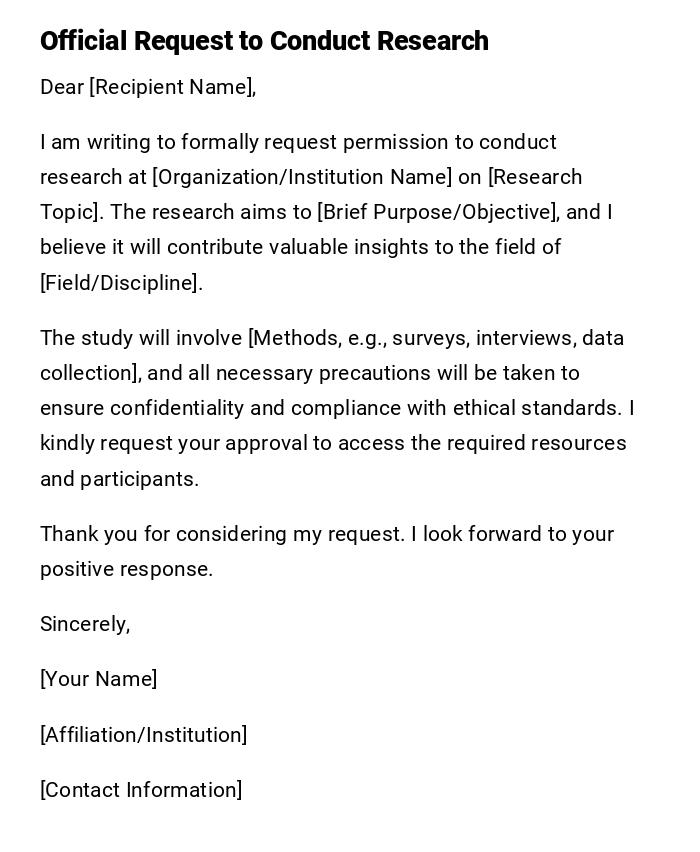
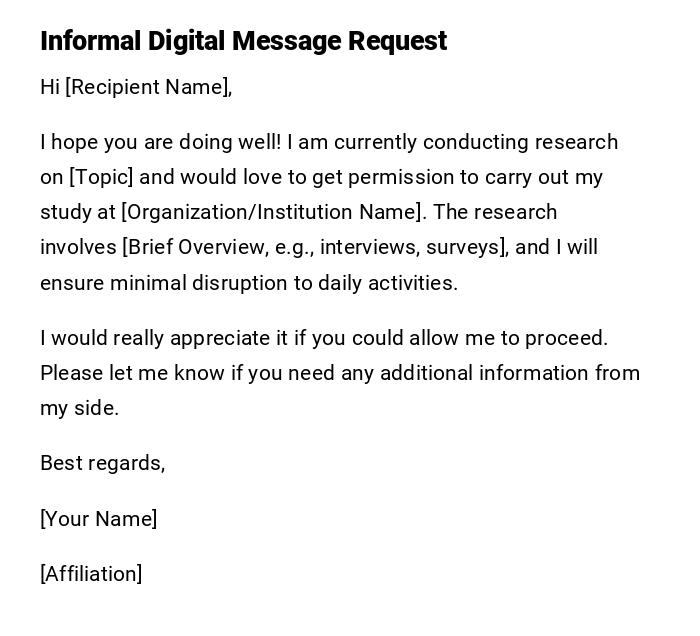
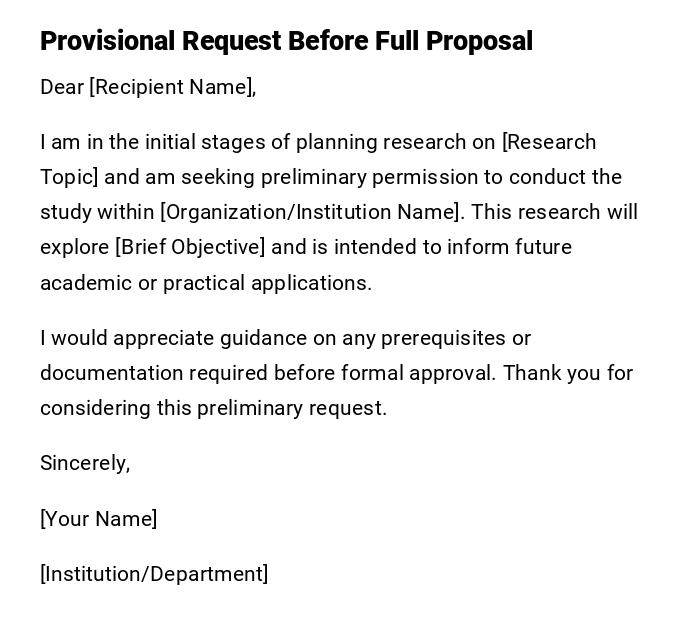
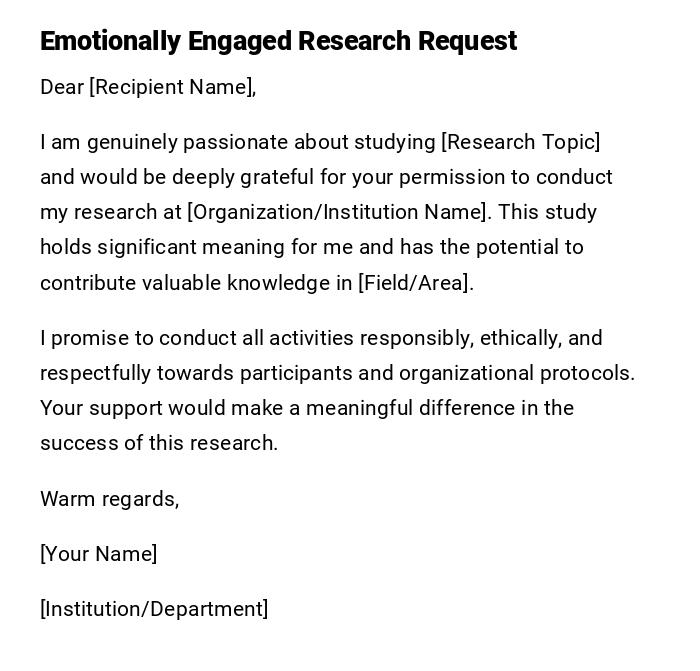
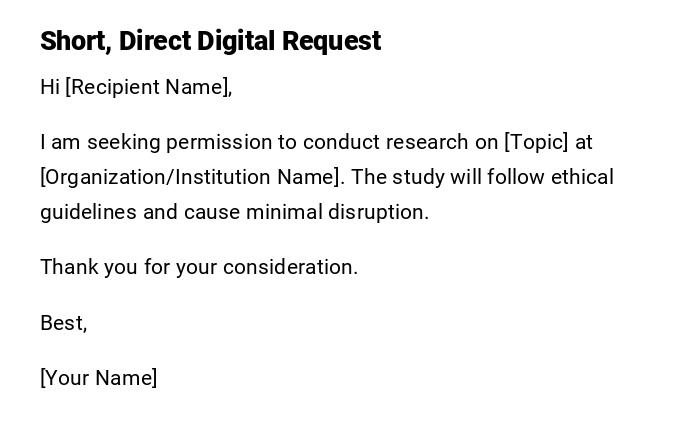
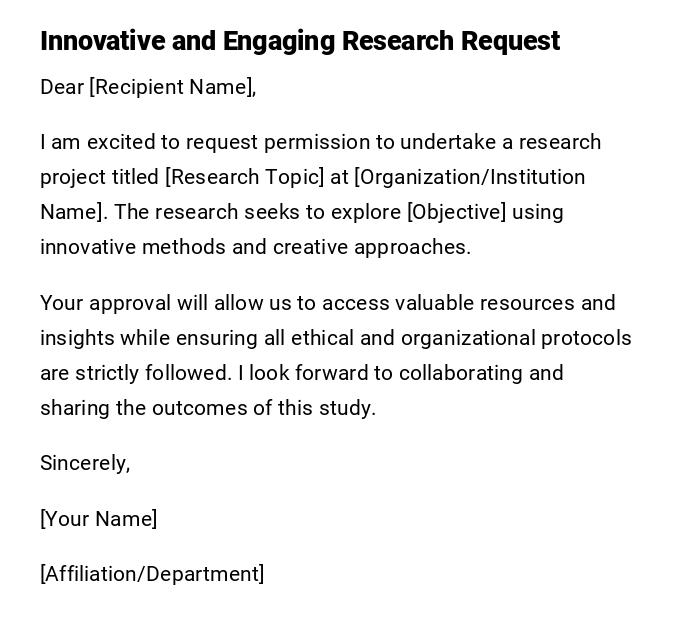

 Download Word Doc
Download Word Doc
 Download PDF
Download PDF